#sultana halime
Explore tagged Tumblr posts
Text




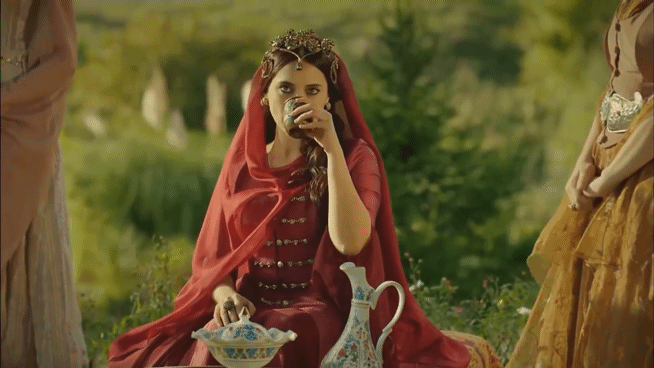
#history#magnificent century#muhteşem yüzyıl#ottoman#sultanas#ottoman history#ottoman sultanas#ottoman valide#valide sultan#Halimesultan#halime sultan#halime and handan#handan sultan#sultana handan#sultana halime
25 notes
·
View notes
Text














"The Valide Sultan’s seat of authority was often placed near the window or in a prominent corner of her chamber, where light illuminated her figure, further emphasizing her elevated status as the mother of the Sultan and the head of the imperial household." - Ottoman Women in Public Space, Madeline C. Zilfi
#Muhteşem Yüzyıl#Magnificent Century#mcedit#Muhtesem Yuzyil#kosemedit#Muhtesem Yuzyil kosem#magnificent century kosem#Muhteşem Yüzyıl Kösem#Hurrem Sultan#Kosem Sultan#history#historyedit#Ottoman history#Asian history#Turkish history#Sultanate of Women#weloveperioddrama#perioddramaedit#period drama#historical drama#Magnificent Century: Kösem#mc: kosem#Awkward-Sultana#Handan Sultan#Halime Sultan#Safiye Sultan#Hafsa Sultan
220 notes
·
View notes
Text




HALIME SULTAN APPRECIATION 5 / ∞
#aslıhan gürbüz#magnificent century: kosem#perioddramaedit#halime sultan#muhtesem yuzil kosem#muhteşem yüzyıl: kösem#the queen of bombastic side eye#sorry not a queen#a sultana
22 notes
·
View notes
Text
Controversial origin of Halime Sultan
For many years the life of Halime Sultan had been a mystery. Not only her place of birth,but even her period in harem and tenure as Valide was unknown. Many thought the mother of Mahmud was killed along with him, some said she survived, but was banished. Even her Muslim name was unknown and was mentioned as fulane sultan for quite a long time, until it was found that she was called Halime sultan.
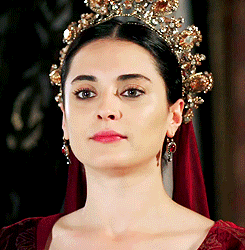
Like almost everything about her life her origin was mostly a mystery, However today it is accepted that she was from Caucasia, particularly from Abkhazia. However, that doesn't make everyone clear about her ethnicity. Confusion mainly comes because the term "Abkhazian" might include several people: Native Abkhazians, who settled here in ancient times, there were two major tribes in Abkhazia ubykh-abkhazs(genetically closer to Circassians) and Georgian-abkhazs(almost genetically identical to western Georgians). However, the number of people in each tribe varied from time to time, however generally Georgian-abkhazians were more loosely-settled, mainly because during the rise of civilization during iron age,pre-classical and classical antiquity, when Abkhazia was part of first Kingdom of Colchis and then kingdom of Egrisi(lazica), both were kartvelian kingdoms, created after unification of native Kartvelian tribes that lived there, two kingdom covered teritories from todays Abkhazia to some parts of eastern Anatolia. Therefore, Georgian-abkhazs promoted that time. In 697, the kingdom of Egrisi devided, into the de-facto kingdom of Abkhazia from 697-780's and the official kingdom of Abkhazia from early 780's to 1008 that included not only modern Abkhazia,but whole teritories of modern eastern Georgia and parts of Turkey and Russia . The official language of the pre 780's kingdom was Georgian, was ruled by Georgian-abkhaz Nobel families and was almost entirely settled by Georgians. After the 780s it was even more dominated by Georgians and that was time, when on the territories of the modern days republic of Abkhazia along with Georgian-abkhazs and ubykh-abkhazs western Georgians actively started to settle. From 1008 to 1490's it became part of the united kingdom of Georgia. After the 1490s it was invaded by Mongolians and divided into western and eastern parts. That is a period when Circassians slowly started to enter Abkhazian territories. Now back to the topic, up until late sixteenth century Abkhazia was Georgian dominated land, in 1570's same time as ottomans, many Circassian tribes started infiltrating Abkhazia and unlike peaceful natives, started to invade homes of weakened Georgians and as a result during the climax of invasion in 1580-90's mass slave trade burst out and thousands of Georgian-abkhaz and mingrelian girls found themselves in ottoman slave market.
Halime sultan was born around 1568-70, therefore in 1580-90's she could have been anywhere from 10-12 to 20-22 years old, considering Mehmed III received his sanjak in 1583, Halime was likely gifted to him that or next year, at very least she was already favourite in 1586, so she was bought quite before that time. So perhaps she was freshly brought little Georgian in the Ottoman slave market? Everything in this theory fits, her age, statistics, fact that slave markets were flooded by Georgians suggest that when we say that Halime was Abkhaz, it means Georgian-abkhaz, not Ubykh-abkhaz and definitely not non-native Circassians.

#history#historical drama#16th century#magnificent century#magnificent century kosem#mc: kosem#ottoman empire#ottomanladies#historical events#georgia#abkhazia#Georgian history#history of Georgia#halime sultan#ottoman sultanas#sultanate of women#sultanas#circassian#women in politics#historical figures#historyedit
35 notes
·
View notes
Text
Master Post - Women
Themes
Costumes | Jewellery | Props
Valide Sultan
Hafsa Sultan
Halime Sultan
Handan Sultan
Kösem Sultan
Nurbanu Sultan
Safiye Sultan
Turhan Sultan
Haseki Sultan
Ayşe Sultan (Harem of Murad IV)
Dilaşub Sultan
Hümaşah Sultan (Harem of Ibrahim I)
Hürrem Sultan
Mahidevran Sultan
Muazzez Sultan
Sultanas by birth
Atike Sultan
Ayşe Sultan (Daughter of Kösem)
Ayşe Sultan (Daughter of Şehzade Bayezid)
Ayşe Hümaşah Sultan
Beyhan Sultan (Daughter of Hafsa)
Beyhan Sultan (Daughter of Turhan)
Bican Sultan
Dilruba Sultan
Esmahan Sultan
Fahriye Sultan
Fatma Sultan (Daughter of Hafsa)
Fatma Sultan (Daughter of Kösem)
Gevherhan Sultan (Daughter of Kösem)
Gevherhan Sultan (Daughter of Nurbanu)
Hanzade Sultan
Hatice Sultan (Daughter of Hafsa)
Hatice Sultan (Daughter of Şehzade Bayezid)
Hümaşah Sultan (Daughter of Safiye)
Huricihan Sultan
İsmihan Sultan
Kaya Sultan
Mihrimah Sultan (Daughter of Hürrem)
Mihrimah Sultan (Daughter of Şehzade Bayezid)
Nergisşah Sultan
Şah Sultan (Daughter of Hafsa)
Şah Sultan (Daughter of Nurbanu)
Concubine Sultanas
Defne Sultan
Farya Sultan/Farya Bethlen
Gülbahar Sultan
Mahfiruze Sultan
Meleksima Sultan
Mihrünnisa Sultan
Rana Sultan
Concubines & Harem Members
Afitap Hatun
Akile Hanim
Anna Hatun
Ayşe Hatun (Harem of Şehzade Mustafa)
Cihan Hatun
Dilşah Hatun
Efsun Hatun
Elanur Hatun
Elif Hatun (Harem of Şehzade Mustafa)
Fatma Hatun
Firdevs Hatun
Firuze Hatun
Gülfem Hatun
Gülnihal Hatun
Gülsen Hatun
Hanife Hatun
Hazal Hatun
Helena Hatun
Katerina Hatun
Mahfiruz Hatun
Nazenin Hatun
Neze Hatun
Nurbahar Hatun
Olga Hatun
Rümeysa Hatun
Sadıka Hatun
Sanavber Hatun
Şayeste Hatun
Yasemin Hatun
Zarife Hatun
Unnamed Harem Members
Servants
Afife Hatun
Canfeda Hatun
Cennet Hatun
Daye Hatun
Derya Hatun
Dudu Hatun
Elif Hatun (Servant of Gevherhan Sultan)
Emine Hatun
Esma Hatun
Eycan Hatun
Fahriye Kalfa
Fidan Kalfa
Gülbahar Kalfa
Gülperi Hatun
Gülşah Hatun
Gülşah Kalfa
Hatice Kalfa
Hircan Kalfa
Kumru Hatun
Lalezar Kalfa
Melek Hatun aka Madame Margaret (Servant of Farya Bethlen)
Melek Kalfa (Servant of Fatma Sultan)
Meleki Hatun
Menekşe Hatun
Nadia Hatun
Narin Kalfa
Nazlı Hatun
Nigar Kalfa
Nilüfer Hatun
Sedef Hatun
Ottoman Citizen
Armin Hatun
Cevher Hatun
Dilanur Hatun
Eleni Hatun
Esmanur Hatun
Ester Hatun
Foundation Ladies
Hanım Ağa
Kalika Hatun
Rakel Hatun
Sabiha Hatun
Zeynep Hatun
Unnamed Istanbul Citizens
Europeans
Anna Jagiellon
Carmina
Catherine of Brandenburg
Gabriella Sfenza De Feo
Gracia Mendes Nasi
Isabella Jagiellon
Princess Isabella Fortuna
Portia Gritti
Sara Hatun
Signora Benetto
Silvia Conterini
Unnamed European Characters
Other
Aybige Hatun
Eftelya Hatun
Rita Hatun
Saliha Hatun
#Muhteşem Yüzyıl#Muhteşem Yüzyıl: Kösem#Magnificent Century#Magnificent Century Kösem#Magnificent Century Kosem#Master Post
17 notes
·
View notes
Text
Family tree of Mehmed III
Mehmed (1566.05.26. - 1603.12.22.) - Handan (~1568 - 1605)
Ayşe 1583-1632/9 - Destari Mustafa Pasha 1602-1610 * 2 daughters and one son, who all died young - Gazi Hüsrev Pasha 1613-1632
Selim 1585-1597
Şah 1587-1617/8 - Mirahur Mustafa Pasha 1604-1610 * three sons, all died young - Cigalizade Mahmud, son of Cigalizade Yusuf Sinan Pasha 1612-until her death * Mehmed (?-a. 1650), Mustafa (?-?), Karahoca Ibrahim Kethüda (?-a. 1650)
Ahmed I 1590-1617
Süleyman ~1593-1597
Nani believes she had one son Osman, who was 3 or 4 in 1600
Mehmed (1566.05.26. - 1603.12.22.) - Halime (~1568 - after 1624)
Hatice 1585-1617? - Mustafa Aga, one Yeniçeri officer
Mahmud 1587-1603
Safiye 1590-? - Davud Pasha 1604/1605 (consummated 1606)-? * Süleyman (after 1606 - after 1662)
Halime - She could be the wife of Tiryaki Hasan Pasha (1604-1611), but maybe she was unmarried until 1622. - She could be the wife of Budin Ali Pasha (?-1616?)
Cihangir 1598-1602 (identity of his mother is not known for sure)
Mustafa I 1600-1639
And Mehmed III had another daughter Hümaşah, but we dont know anything about her. She could be the wife of Tiryaki Hasan Pasha (1604-1611), or the wife of Budin Ali Pasha (?-1616?) or none of those.
Theories:
Ayşe: I believe she was the eldest daughter of Mehmed, and so the daughter of Handan. Mehmed got Handan after his circumcision in 1582 June, so they could start reproduction in August or so. In 1600 Nani said, the sultan had a daughter, who was 18 years old and that the sultan is thinking about her possible husbands. Based on ottoman calculations 18 is actually 17, so she was born in 1583. Back then Handan as a new favourite, gift of the beloved aunt of Mehmed, possibly was a soley sexual partner for a while making logical that Mehmed's first child was Handan's. And as Destari Mustafa seems to be the first Damad of Mehmed III's daughters, his wife should be the eldest Sultana.
Ayse: She survived her husband in 1632 but does not mentioned after 1639 in the register she was listed previously, which could mean she died between 1632 and 1639 or she moved back to the Old Palace, and so we should search for her in another register.
Halime: All we know is that she was unmarried in 1622. This could mean: she was too young to be married off or simply she was widowed. I personally think she was the wife of Tiryaki Hasan Pasha between 1604 and 1611, then a widow until 1622 (at least), or also the wife of Budin Ali Pasha until 1616.
Hatice: Actually the identity of her mother is not known for sure. She is referred to as Halime's daughter in one source, however, her husband's identity is wrong in that source, so maybe she was not Halime's but a random consort's. Her husband is quite low-level compared to others, so maybe she did not have a brother. OR the identity of the husband (yeniçeri officer) supports the original theory of her being Halime's. We know how Mahmud and Halime had a close relationship with the janissaries and then. Maybe Hatice had something to do with it through her hubby? True, her husband was a Yeniçeri leader only in 1616, and true, that we don't know the exact date of their wedding. The agha died at the end of 1616 and Hatice is lost from history. Maybe she died, maybe remarried.
For Hümaşah it is possibly she died before being married to anyone, or she may was the wife of Tiryaki Hasan Pasha between 1604 and 1611, and/or the wife of Budin Ali Pasha until at least 1616.
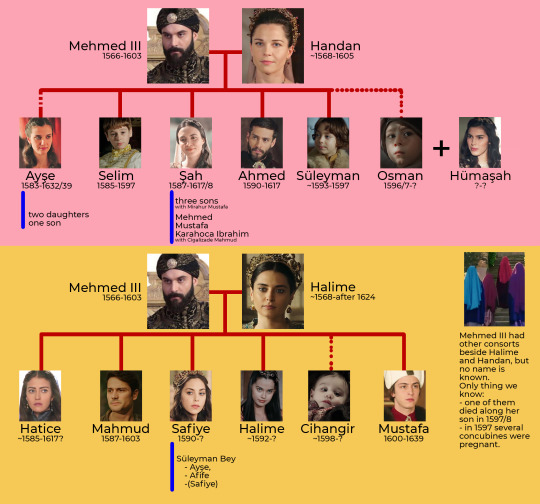
21 notes
·
View notes
Note
Sorry to bother you in this account, I would have a question about Ümmügülsüm Sultan, the possible daughter of Ahmed I. The relazione of Angelo Alessandri from 1637, Page 649 says: "Ha il Gran Signore di congionti per sangue quatro sorelle ancora, ma fuori di seraglio, essendo tutte maritate in visiri." And since I am not really speaking italian, I am not sure if "per sangue quatro sorelle" means full-sister or just a way to say sister (and so can mean half sister too). One of my followers - who says he speaks italian - says it means full-sister and confirms that beside Ayse, Fatma and Hanzade there was another full-sister of Murad IV. I mean while I have my doubts, Alderson also lists one Ümmügülsüm (wife of Halil Pasha) based on harem registers, who had the same amount of salary in 1639 as Ayse, Fatma and Hanzade, the daughters of Kösem (and some other women - possible daughters of Murad III had the same amount, while Atike and one Hatice possibly daughters of Ahmed I had less salary). Also, there is the known other register that you also mentioned on ottomanladies page, based on Tezcan: “A privy purse register from 1622 gives the names of five unmarried princesses, who may be daughters of Ahmed, Osman II, and even Mehmed III: Umm-i Külsum, Hanzade, Halime, Fatma, and Akile.” The fact that there was one Ümmügülsüm in 1622 who was still unmarried, and then in 1639 she had the same amount of stipend as Ayse, Fatma, Hanzade and the relazione mentioning that 4 (full)sister thing, maybe suggests that Kösem and Ahmed MAY had another daughter together, Ümmügülsüm? What do you think?
Hello! I guess my askbox on ottomanladies is still closed.
So, your follower is right; what Angelo Alessandri says in his relazione is that Murad IV has four full-blooded sisters who all live outside the palace because they are married. When I read this part, I simply assumed that the fourth princess was Gevherhan but we don’t have any information about her after Recep Pasha’s death in 1632. Then, I assumed he was wrong because it wouldn’t be the first time a European ambassador mistook half-siblings for full-blooded siblings.
About Ümmügülsüm, I have always assumed he was a daughter of Mehmed III’s or Murad III’s. I have never paid attention to her, as I’m sure you know from my posts on ottomanladies.
But you made me curious so I spent some time looking into this.
First, I think you meant Dumas when you mentioned that list based on harem registers because I have found it in Les Perles de Nacre du Sultanate. Alderson doesn’t list an Ümmügülsüm Sultan among Ahmed I’s daughters (unless I somehow missed it).

Secondly, I think there is a problem with this source: on page 62, the register is from February 1649 to February 1650. In Annex A, though, (page 461), she says that the same register is dated February 1639. So what is the truth? February 1639, because the register keeps saying “Şevval 1048”, and that’s February-March 1639 (you can google it). The mistake on page 62 is… weird, though.
Moreover, the list above is somewhat different from the transliteration she put in Annexe A. For example, on page 463 she says that the register says “Hümaşah Sultan merhum Nakkaş Hasan Pasha”, but on the list she put on page 62, the same Hümaşah Sultan is married to one Hüseyin Pasha. I don’t understand why she changed the source without addressing it— or is it just a typing mistake? I hope it is because I think Hümaşah Sultan was truly married to Nakkaş Hasan Pasha: Nakkaş Hasan Pasha was identified as married to one of Ahmed I’s aunts by the Baron de Selignac, and a letter dated 6 October 1642 by a Ragusian diplomat lists among Ibrahim’s aunts one “Humascie sultana moglie di Hasan Pascia [Hümaşah sultan wife of Hasan Pasha]”. In another letter, this one dated 7 July 1648, Hümaşah is identified as “moglie di Nachasc Hasanpascia Humasce sultan vedova [Hümaşah sultan, widow of Nakkaş Hasan Pasha]”.
If Dumas voluntarily changed Hasan Pasha into Hüseyin Pasha then I don’t know why she did it because contemporary evidence suggests that this princess called Hümaşah was Ahmed I’s aunt and therefore Ibrahim’s great-aunt (I won’t fault the Ragusian diplomat for not stating the difference because it wasn’t done often at the time), and was married to Nakkaş Hasan Pasha, who is called “merhum” in the harem register because he was deceased at the time.
Similarly, on page 462, it is listed one “Kameri Sultan merhum Sofi Bayram Pasha”, but on the list on page 62, she is called Fahri. Again, what prompted Dumas to change the wife’s name? Is it because Öztuna says that Fahri/Fahriye Sultan (daughter of Murad III) was married to Sofu Bayram Pasha? Then again, why was she called Kameri in the register? Is it a mistake from the clerk or did she have multiple names? Or did Dumas transliterate her name wrong? Or did she change the princess’ name into Fahri because that’s what Öztuna says? Interestingly, in the family trees in Annex B, she’s called Fahri again. The same Ragusian diplomat above also lists the wife of Bayram Pasha: “Vanni sultana moglie di Soffi Bariam Pascia”; unfortunately I cannot say what Vanni should be because it doesn’t sound like Kameri at all. It could sound like Fahri but… it’s a stretch.
Beyhan Sultan, Safiye Sultan, and Mihrimah Sultan are widows too but it’s difficult to identify them because their husbands are one “Mustafa Pasha”, one “Mehmed Pasha”, and a “Mehmed Pasha from Kefe”. I tried to google this Mehmed Pasha from Kefe and everyone says he was married to Mihrimah Sultan, daughter of Murad III. The problem is the sources of this claim (on those websites) do not say this. The Ragusian letter talks about a Beyhan Sultan married to a “Mustai Pascia” which could be Mustafa Pasha, but this is all I have to say.
I also would like to highlight that the princesses listed in the Ragusian letter are those who received gifts from the Ragusian diplomat so there could have been more, especially aunts.
As for “Atike Sultan Kenan Pasha” (who receives 9,900 aspers per month): she seems to be Ahmed I’s daughter Atike (also confirmed by the Ragusian letter, who lists her among Ibrahim's sister).
Now, about “Ümmügülsüm Sultan Halil Pasha” (who receives 12,900 aspers per month): I still personally maintain that she was an aunt and not a sister. I could not identify her, nor her husband Halil Pasha, but we have to keep in mind that we don’t have all the names of Mehmed III’s daughters. In the Ragusian letter dated 1648, there’s one “moglie di Hersechli Ahmet Pascia Iumi sultan [wife of Hersekli (? it could mean that he comes from Herzegovina) Ahmed Pasha, Iumi Sultan” (Iumi kind of sounds like Ümmi). It’s basically ten years later Dumas' list so she could have changed husband in the meantime but unfortunately, I couldn’t identify “Hersechli Ahmet Pascia”— if someone else has information about him, please do not hesitate to share (with sources, please).
I’m sorry this was so long and unhelpful, I was carried away :(((
EDIT: I have found the Ragusian letters in V. Miović - Per favore della Soltana: Powerful Ottoman Women and Ragusan Diplomats
35 notes
·
View notes
Text
My analysis/defense of Handan
An unlikely Valide Sultan
One of the main reasons I gravitate towards Handan character is because she was an unlikely Valide Sultan. Not just because her son was not the eldest but because while its never explicitly said, I feel like they were many hints that Handan was not a true favorite, especially if you compare her with Halime. Halime had at least three children, Handan only had one. Halime (at least in the beginning) had powerful contacts, while Handan appeared to be very isolated, with only Dervis and Haci as allies. Halime was influential enough that Safiye would try to bring her down (burning Cennet's face and making it seem like Halime was culprit) while we have no such stories with Handan.
On top of that, for both Handan and Halime, it must have been particularly difficult to be sultanas in a harem dominated by Safiye, who in the show is a true bully and tries to crush anyone that could outshine her even a little. It also seems that Handan has long been identified as "weak" by Safiye, because she has no issue talking down to her and humiliating her when Handan is Valide Sultan. And if she feels comfortable enough to do that when Handan is Valide, one can only wonder how she treated her when she was just a concubine.
Her being an unlikely Valide Sultan also explains why she was so adamant to have Mustafa killed, she must have lived in fear for years then when Mahmud ascends, which seemed the most likely, he would murder her son and of course, the fratricide law has been embedded in Ottoman dynasty politics for so long that its difficult for anyone to believe that its over just because a 13 year old boy sultan said so. And honestly both Handan's and Halime's perspective are valid, they can't take any chances for the safety of their sons, and they both end up doing things that reinforces the fear of the other, which is both ironic and tragic
The price of being soft
Being Valide Sultan does not come easy to Handan, it does not suit her like Hafsa, Safiye or Kosem. Her demeanor is too soft and fragile, and honestly she's not the brightest. And because of that she is constantly being denied the respect she deserves as Valide Sultan, being outshined by Safiye and then immediately after that Kosem, and she is unable to fight back effectively.
Handan is also a romantic, she finds true love (after years of being subjected to her enslaver, who on top of that was a particularly horrible man) with Dervis and while she does nothing physical she still submits to this love and its her one source of joy, but also a source of pain. I also find it particularly poignant when she tells him that being a sultana is a prison for her and that Dervis is her "freedom" -an incredibly underrated moment because this is one of the only, and the most beautiful moment of acknowledging the horrific side of being a concubine
In the end her suicide does not seems to me to be just about being afraid that Ahmet will kill her (though its horrific Handan even though that though) but because she tasted freedom and love and cannot go back to her cage now.
Her son was the worst son
Yes worse than Murad. Murad was horrible but I find it easier to understand his perspective, his mother was controlling, undermined him, wanted him to be a puppet ruler and would flat out tell him to his face that she's the only reason he can have keep the throne, Kosem/Murad is a toxic relationship where they both have their faults. But Ahmet? He had very little regards from the beginning for his mother. He did not respect her and did not care that everyone else was disrespecting her, he did not value her opinion or feelings, consistently put a concubine he only knew for a year above her, and of course physically assaulted her and exiled her, when she was trying to ensure his safety.
Her conflict with Kosem
It made perfect sense for her to be wary of Anastasia, she was gift from Safiye destined to control Ahmet. Anastasia also insulted the sultan in front of the entire harem, which would have gotten anyone else killed on the spot. It also made perfect sense for her to believe she had poisoned Ahmet, because on top of being a gift from Safiye, she had spent the night with Ahmet when he got sick and then ran away. And yet Handan was still willing to believe in her innocence eventually.
Then we have the fact that Kosem betrayed her and like she had a good reason but its still a betrayal that Handan would feel deeply since her son assaulted her and she was humiliated in front of the whole harem
And yet honestly the way Handan "antagonized" Kosem was so light in comparison to what we saw from other mother in laws? Also Kosem decided to fight against Handan because Handan, the Valide Sultan, had the AUDACITY of trying to be the Valide Sultan. Like its so crazy to me that what Kosem takes as a "declaration of war" is that Handan did not let her raise Osman, even though not only it makes perfect sense for him to be raised by his grandmother, it was also considered inappropriate for princes to have close relations with his father's concubines past a certain age (which is why in real life Ahmet started preventing Kosem from seeing Osman). And then she complains to Cennet that Handan wants to control the harem (that's literally her job????)
Kosem's self righteous anger to Handan's feelings for Dervis and hiding the fact that he killed Mehmet III was just an excuse because she could not handle the fact that other people were influential in Ahmet's life. And Haci Agha was just being a bitch for no reason (and its hilarious to see him act so self-right but when Kosem asks him to sterilize a girl, murder a pregnant girl or even kill a little child whose also the literal sultan he's like "yes boss")
Anyway, Handan deserved better both on the meta level that the show humiliated her and erased her regency to prop up Kosem, but also in the show itself
8 notes
·
View notes
Text
i love that i can use hurrem with her kids for my gil galad fic lmao. it makes me wish i could give them more kids to utilize Mehmet amd Hurrem scenes but at least Selim is a redhead and Mihrimah has dark hair




special thanks to @awkward-sultana and @elizabeth-halime for making such gorgeous gifsets
8 notes
·
View notes
Note
Hello,I read somewhere that there is version in Secrets of the Ottoman court,private lives of the Ottoman sultans and Inside the Sergalio by John Freely,based on English ambassador Thomas Roe that during the second reign of Mustafa I,Halime Sultan and Kara Davud Pasha had plotted to execute all the survivng sons of Ahmed I and to ensure the throne for the son of Kara Davud Pasa and his wife who was imperial sultana and daughter of Halime Sultan- Sultanzade Suleyman Bey as the only heir of Mustafa I. The chief of the white eunuchs with his men secretly had gone to strangle the princes,but they had been stoped entering by palace guards who had informed the janissaries and sipahis who were on the outer guard of the palace and investigation had begun,in which the white eunuch and his men were executed,Kara Davud Pasa had lost his position as grand vizier,while the main culprit Halime Sultan had escaped punishment as she was consider mother of the saint Sultan Mustafa. Do you maybe know more about it?
This is what John Freely says:
Davut Pasha had married the valide's daughter, Mustafa's sister, who subsequently bore him a son named Süleyman. According to Sir Thomas Roe, the valide and her son-in-law concocted a plot to have all of the surviving sons of Ahmet I murdered, so as to leave Davut's son Süleyman as the only living male in the Osmanlı line other than Sultan Mustafa, who had fathered no children and resisted all attempts to introduce concubines into his harem. Thus the valide's grandson would inherit the throne, or at least she and Davut Pasha so hoped. The valide's henchman, the chief white eunuch, led a group of his men into the Old Saray to kill the young princes, but they were stopped by the palace pages. The pages alerted the Janissaries and Sipahis on duty around the palace, who apprehended the would-be assassins and hanged the chief white eunuch in the Hippodrome as a public spectacle. The soldiers demanded justice, and as a result Davut Pasha was dismissed as grand vezir, though the valide escaped punishment because of her privileged position as the mother of Sultan Mustafa, whose madness led the populace to consider him a saint. Soon afterwards the Janissaries did away with Davut Pasha, strangling him in the same chamber of the Castle of the Seven Towers where, on his order, they had killed Osman. — J. Freely, Inside the Seraglio, 37%.
This is what Thomas Roe says:
(I have fixed some of the spelling)
On Satterday evening, the first of June following, the capiaga or maior domo of the seraglio, having received a secret order to remove the brethren of Osman from their lodgings, and in the night to strangle them; as he was performing his command, ayded with a fewe of the carnifices to carry away the princes, they cryed out; the pages running to the noise, and encouraged by the caslariaga, who had some suspition, without further examination kill the capiaga; now almost every order having risen against their own head, that night they sent secretly to the Janizaries and Spahees to enform them what the had done, and in the morning early hanged his body in the Hippodrome for a publique spectacle. The soldours retorned in fury to court in favour of the pages, and demanded justice against those who had consented to this wicked order, which had made an end of all the Ottoman race, only this Mustafa left alive, who is so holy a saint, that he will not people the world with sinners, nor endure any women about him. The innocent king protests he knows nothing of this purpose, and if his command were procured, it was gotten by subreption; and he is easily believed. But his mother, another Livia, and the new vizier Daout bassa, who had her daughter to wife, were vehemently suspected. It was a day of divan or councill, but these soldiours would suffer none, until they had an accompt of this treason. The vizier denyes all, the mother is a woman, and hidden in the house, yet it is very likely that both were guilty, to uphold and secure their owne authority, it beeing rumored, that the vizier determined to place subditiously, in the roome of the elder prince, his owne sonne, and very like him, and so to governe Mustafa for a tyme, and by his remove to establish himselfe and his race for ever. — The negotiations of Sir Thomas Roe, in his embassy to the Ottoman porte, from the year 1621 to 1628, p. 52.
13 notes
·
View notes
Note
i acknowledge that this is a repetitive question, but i'm curious about how would you rank the SOW sultanas in the MC franchise based on intelligence.
It's not a repetitive question at all! Anyway all of this relies on how you define intelligence if you ask me. How do things like making mistakes that cost you but bouncing back learning from them, impulsivity, raw success and other such qualities.
Mahidevran Sultan: She very often gives Mustafa fairly good advice. But the strategies that she herself acts on usually aren't that well thought out. She's no fool but she also isn't the smartest sultana by far.
Hürrem Sultan: She is very often, at least at first, hampered by her own hotheaded and impulsive tendencies. But she can be very observant and very quickly learns how to use the things that she picks up on to her advantage. She is very strategically adept and very good at reading people. Not to mention her own character growth and evolution clearly showing her comparative self-awarness and ability to learn and adapt. Most of her failures, especially later on, hinge on the fact that she is genuinely caught between a rock and a hard place. Easily the majority of her errors are forced.
Nurbanu Sultan: She too can be hotheaded but she also learns quickl and thinks on her feet. The only problem with analysing her is the fact that we only have one season of her and don't ever see her as Valide. So there's crucial steps to her development and evolution that we miss out on. Which makes judging her significantly harder than judging say Hürrem or Mahidevran.
Safiye Sultan: Disclaimer that I haven't seen MC:K In a while but she's another character who is hard to judge just because we miss out on so much of her development. She's clearly very intelligent and able to wield power. But very often what we see of this comes down more to the threat of violence than it does to traditional harem scheming per se. But she is very astute especially when it comes to diplomacy.
Handan Sultan: Her intelligence wasn't what stood out to me about her. It was her anxiety.
Halime Sultan: She was clearly quite intelligent and had a mind for schemes but she was severely hampered by desperation and being caught between a rock and a hard place.
Kösem Sultan: She learns a lot and learns quickly although early on especially she could be naïve. But particularly season 2 Kösem was politically one of the most adept characters in the show. You don't get to where she got without having a good head of braincells. And when she makes mistakes it's usually due to arrogance or desperation rather than anything else.
Turhan Sultan: I mean she is ruthless so I'll give her that much...but once again my ability to properly analyse her characterisation is the utter lack of characterisation that she gets which is lost to the criminal amount of timeskips that we got towards the end of season 2 of MC:K.
2 notes
·
View notes
Text

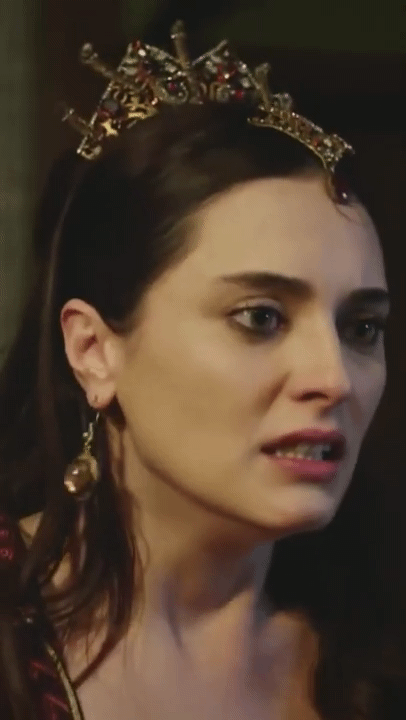
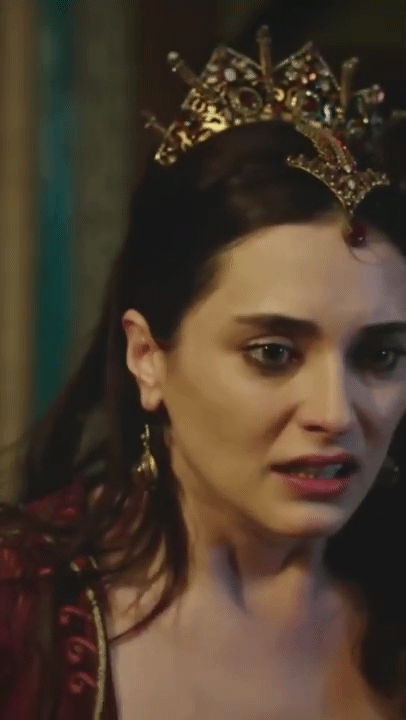

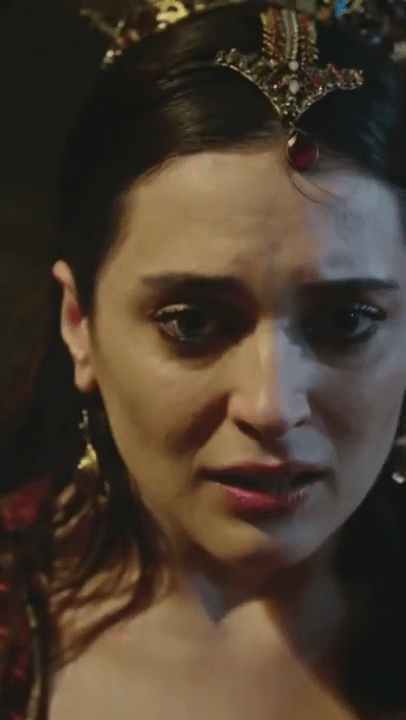
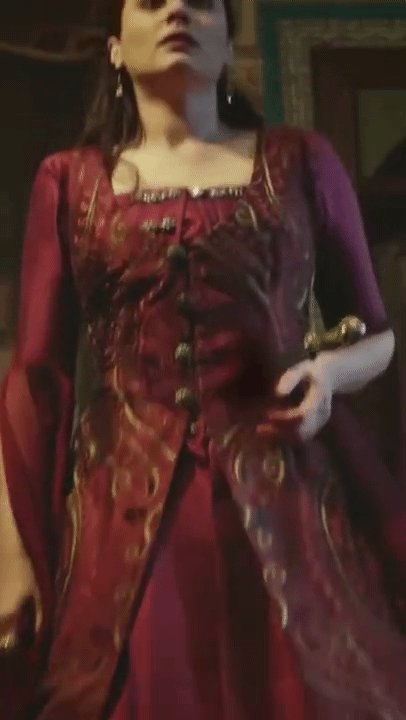

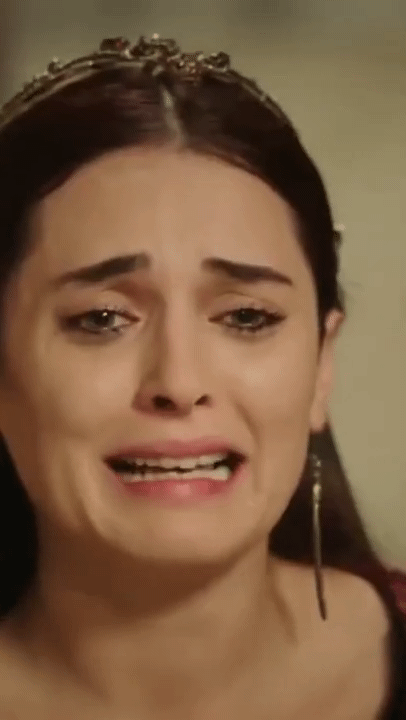
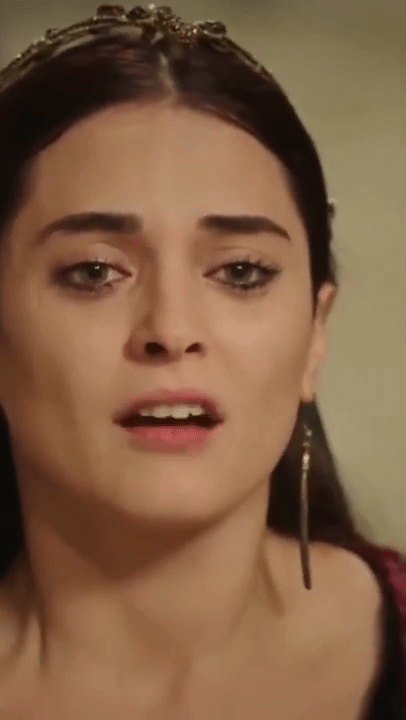
#history#magnificent century#muhteşem yüzyıl#ottoman#sultanas#ottoman sultanas#ottoman history#ottoman valide#valide sultan#halime gifs#valide halime sultan#halime sultan#Halime#ottoman woman#ottoman harem#aslihan gulbuz#my favorite
32 notes
·
View notes
Text









(Almost) Every Costume Per Episode + Halime Sultan's yellow and blue lace kaftan in 1x30 (requested by anonymous)
#kosemedit#Muhtesem Yuzyil kosem#magnificent century kosem#Muhteşem Yüzyıl Kösem#Halime Sultan#weloveperioddrama#perioddramaedit#period drama#historical drama#Breath of the World#costumeedit#costumes#costume drama#Almost Every Costume Per Episode#request#Awkward-Sultana
33 notes
·
View notes
Text




HALIME SULTAN APPRECIATION 1 / ∞
#halime sultan#perioddramaedit#magnificent century: kosem#muhteşem yüzyıl: kösem#aslıhan gürbüz#she truly was the most gorgeous sultana#don't get me started on her goth eyeliner and witch hobby
13 notes
·
View notes
Text
ŞİİR
Kanuni Sultan Süleymanın Hürrem Sultana Yazdığı 7 Cihanım Adlı Şiiri
Celis-i halvetim, varım, habibim mah-ı tabanım
Enisim, mahremim, varım, güzeller şahı sultanım
Hayatım hasılım,ömrüm, şarab-ı kevserim, adnim
Baharım, behçetim, rüzum, nigarım verd-i handanım
Neşatım, işretim, bezmim, çerağım, neyyirim, şemim
Turuncu u nar u narencim, benim şem-i şebistanım
Nebatım, sükkerim, genc,m, cihan içinde bi-rencim
Azizim, Yusufum varım, gönül Mısrındaki hanım
Stanbulum, Karamanım, diyar-ı milket-i
Rumum Bedahşanım ve Kıpçağım ve Bağdadım,
Horasanım Saçı marım, kaşı yayım, gözü pür fitne, bimarım
Ölürsem boynuna kanım, meded he na-müsülmanım
Kapında çünki meddahım, seni medh ederim daim
Yürek pür gam, gözüm pür nem, Muhibbiyim hoş halim!
KANUNİ SULTAN SÜLEYMAN
TERCÜMESİ
Benim birlikte olduğum, sevgilim, parıldayan ayım,
Can dostum, en yakınım, güzellerin şahı sultanım.
Hayatımın, yaşamımın sebebi Cennetim, Kevser şarabım
Baharım, sevincim, günlerimin anlamı, gönlüme nakşolmuş resim gibi sevgilim, benim gülen gülüm
Sevinç kaynağım, içkimdeki lezzet, eğlenceli meclisim, nurlu parlak ışığım, meş’alem.
Turuncum, narım, narencim, benim gecelerimin, visal odamın aydınlığı,
Nebatım, şekerim, hazinem, cihanda hiç örselenmemiş, el değmemiş sevgilim.
Gönlümdeki Mısır’ın Sultanı, Hazret-i Yusuf’um, varlığımın anlamı,
İstanbul’um, Karaman’ım, Bütün Anadolu ve Rum ülkesindeki diyara bedel sevgilim.
Değerli lal madeninin çıktığı yer olan Bedahşan’ım ve Kıpçağım, Bağdad’ım, Horasan’ım.
Güzel saçlım, yay kaşlım, gözleri ışıl ışıl fitneler koparan sevgilim, hastayım!
Eğer ölürsem benim vebalim senin boynunadır, çünkü bana eza ederek kanıma sen girdin, bana imdad et, ey Müslüman olmayan güzel sevgilim.
Kapında, devamlı olarak seni medhederim, seni överim, sanki hep seni öğmek için görevlendirilmiş gibiyim.
Yüreğim gam ile, gözlerim yaşlarla dolu, ben Muhibbi’yim, sevgi adamıyım, bana bir şeyler oldu, sarhoş gibiyim. Bir hoş hale geldim.
KANUNİ SULTAN SÜLEYMAN
#kanuni#hürrem sultan#aşk#platonik#ben sana aşıktım#acı#aşk sevgi#aşka dair#aşk ile#filenin sultanları#sultanulashiqeen#mahidevran sultan#nostalji#classic film#hatice sultan#george cukor#classic cinema#period drama#aşk acıtır#imkansız aşk#youtube#mektup#bilinmeyen bir kadının mektubu#milenaya mektuplar#aşk mektupları#veda mektubu#sevgiliye mektup#şiir#şiirsokakta#şiirheryerde
6 notes
·
View notes
Text
#prev tags yes this is such a good reaction image oh my god#tfw your daughter wants to MURDER HER CHILD NEPHEWS????#halime sultan#kosem la sultana#magnificent century: kösem#muhteşem yüzyıl: kösem#magnificent century#muhteşem yüzyıl
honestly i'm fascinated by how singleminded dilruba is. she's a fairly one-note character but i find her surprising in how she's so completely ruthless both to people she considers enemies and even, to some degree, to herself. (what comes to my mind is her telling kosem "do you really think my mother will sacrifice mustafa for me?" while apparently being completely accepting of the fact that halime would let her die if it would save mustafa's position as sultan.) and it's interesting that halime is caught off guard by how extreme she is sometimes -- because clearly halime would have been one of the main influences of dilruba's life, and clearly they want the exact same goal and are wholeheartedly united in that, but dilruba is willing to cross lines that even halime isn't. not even just that, halime is shocked by the lines that dilruba is willing to cross
halime is so flabbergasted at dilruba lmaooo her expression

#honestly wish we got more about their relationship too#halime sultan#dilruba sultan#muhteşem yüzyıl#mc tag#self rb
12 notes
·
View notes